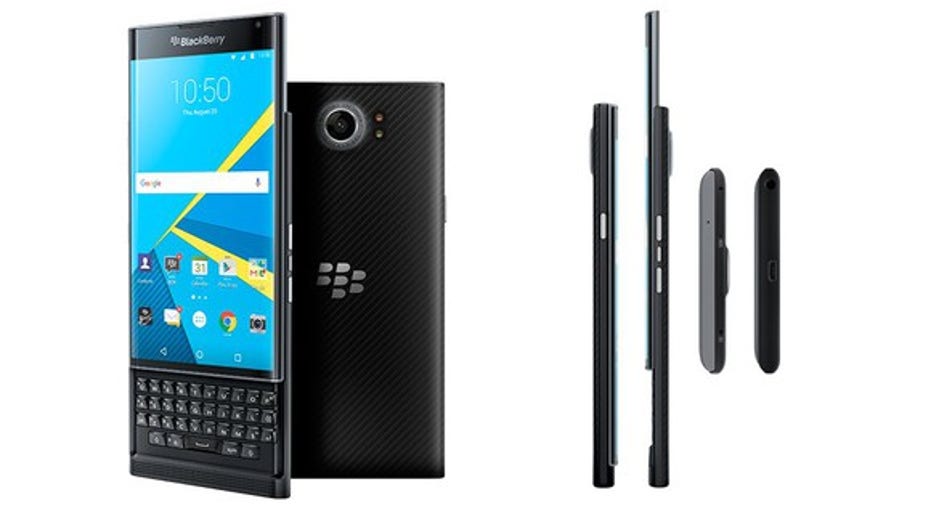BlackBerry Ltd. Finally Stops Making Smartphones

BlackBerry (NASDAQ: BBRY) recently announced thatit will stop developing its own smartphones and outsource the production of future devices to its partners instead. In a statement, CEO John Chen said that the move "allows us to reduce capital requirements and enhance return on invested capital."
That decision isn't surprisingsince Chen previously stated that BlackBerry would quit smartphones if the unit couldn't turn a profit. Last November, Chen said that the hardware unit had to sell 3 million to5 million phones annuallyto break even. However, BlackBerry sold only about 900,000 phones in the first half of this year.
The DTEK50. Image source: BlackBerry.
BlackBerry also recently set the stage for the outsourcing move by launching the DTEK50, a rebranded Android clone of TCL's Alcatel Idol 4S. By outsourcing hardware production to other OEMs -- a strategy Nokia hasalso adopted -- BlackBerry can generate licensing fees from its brand while eliminating the overhead risks of producing in-house devices, allowing BlackBerry to invest more cash into its growing software and services business. The company's first licensing agreement will be through a new joint venture inIndonesia, BlackBerry's strongest market.
How did BlackBerry's smartphone empire crumble?
Between 2009 and 2016, BlackBerry's share of the global smartphone market plunged from a peak of 19.9% to0.1%. That happened because BlackBerry missed the technological shift toward touchscreen phones and major mobile app ecosystems.
Instead, it repeatedly insisted that its strength in enterprise, supported by its robust security features, could fend off Apple's iPhones and Alphabet's (NASDAQ: GOOG) (NASDAQ: GOOGL) Android Army. However, iPhones and Android devices became more secure which each OS update, and companies relaxed their bring-your-own-device rules -- encouraging many enterprise users to ditch their aging BlackBerries.
BlackBerry tethered itself to Android by letting users sideload apps and installing Amazon.com's Android Appstore on its devices, but those desperate moves didn't stop the bleeding. Last November, it launched its first fully Android device, the Priv, but many consumers balked at its initial $700 price tag. The $300 DTEK50 was launched as a response to that criticism, but the device was quickly lost in a sea of similar mid-range Android devices.
The Priv. Image source: BlackBerry.
Why is software now the top priority?
In response to its decline in hardware, BlackBerry aggressively expanded its software businesses. These businesses include BlackBerry Enterprise Service, a "control panel" for monitoring employees' mobile devices; BlackBerry Messenger, an enterprise messaging app; QNX, an embedded OS for connected cars; and mobile device management solution vendor Good Technology.
These software solutions let BlackBerry connect to a wide variety of mobile devices across multiple operating systems, instead of serving only BlackBerry devices. Doing so keeps BlackBerry relevant in the enterprise space even if it lacks a leading smartphone platform.
Revenue from BlackBerry's software and services unit hit $527 million in fiscal 2016, exceeding the company's prior target of$500 million and accounting for 24% of its top line. Chen expects the business to grow 30% this year, which would account for nearly half of the company's projected sales. However, the dying hardware business (and its dependent subscriptions) are still expected to cause the company's sales to fall 32% this year and 21% next year. But on the bright side, the software business' higher margins are expected to narrow its losses.
How much longer will BlackBerries exist?
BlackBerry won't design or produce its own phones anymore, but it isn't ready to kill off all its phones yet. Chen has stated that theiconic physical keyboard will live on after the outsourcing move, but it's unclear if its partners are as eager to launch new devices with that aging form factor.
Therefore, I believe that most of BlackBerry's future phones will probably look a lot like the DTEK50 -- generic Android touchscreen devices without any standout features. There might be some demand for these BlackBerry devices in Indonesia, but it's hard to see them gaining much ground against Apple, Samsung, and other market leaders across the world.
A secret billion-dollar stock opportunity The world's biggest tech company forgot to show you something, but a few Wall Street analysts and the Fool didn't miss a beat: There's a small company that's powering their brand-new gadgets and the coming revolution in technology. And we think its stock price has nearly unlimited room to run for early in-the-know investors! To be one of them, just click here.
Suzanne Frey, an executive at Alphabet, is a member of The Motley Fool's board of directors. Leo Sun owns shares of Amazon.com. The Motley Fool owns shares of and recommends Alphabet (A shares), Alphabet (C shares), Amazon.com, and Apple. The Motley Fool has the following options: long January 2018 $90 calls on Apple and short January 2018 $95 calls on Apple. Try any of our Foolish newsletter services free for 30 days. We Fools may not all hold the same opinions, but we all believe that considering a diverse range of insights makes us better investors. The Motley Fool has a disclosure policy.



















